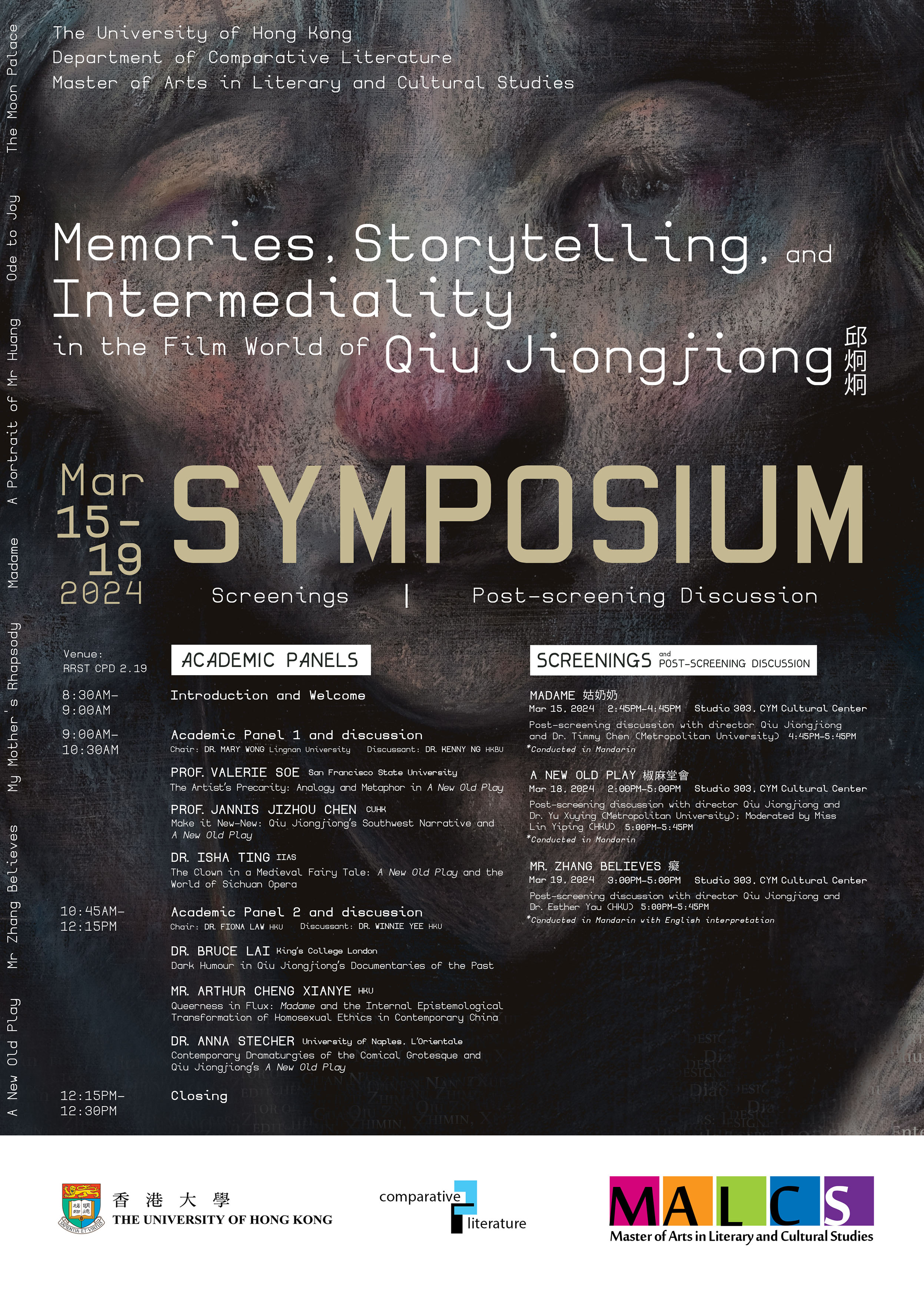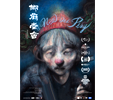About the Symposium



Memories, Storytelling, and Intermediality in the Film World of Qiu Jiongjiong 邱炯炯

The Dept. of Comparative Literature at the University of Hong Kong invites speakers to present research at a seminar focused on the films of internationally acclaimed Chinese independent filmmaker Qiu Jiongjiong. A major contributor to the growth of Chinese independent cinema from the mid-2000s to 2012, Qiu is known for his documentary portraits of marginalized Chinese subjects relegated from mainstream society. Eschewing the observational mode of his contemporaries and their realistic static shots of everyday life, Qiu calls upon his intermedial background as a playwright, stage actor, and visual artist to vivify performative portraits of charismatic characters living through periods of monumental change, from the cultural revolution to the reform and opening up, as well as neoliberalization endemic to the post-socialist era.
Recalling personal minor histories, such as his family’s embedded influence on Sichuan Opera, Qiu uses experimental techniques to create unique assemblages of sound, image, and narrative that generate intertextual, intergenerational, and affective resonances. Qiu’s alienating yet intimate documentaries “evoke and record social and political material that mainstream Chinese culture is uncomfortable with” (Kraicer 2022). He gained critical acclaim at Chinese film festivals with his "chatterbox trilogy," which focuses on dynamic subjects such as a retired Sichuanese police officer in A Portrait of Mr. Huang (2009), whose jovial demeanor offsets his horrifying tales of murder and cannibalism. Chinese audiences and critics embraced Qiu’s most unforgettable subject, Fan Qihui/Bilang de Linphél of Madame (2010). A tailor of couture knockoffs by day and drag stage performer by night, Fan/Bilang’s comedic insights and melancholic obsessions with the aesthetic valuations of contemporary Chinese beauty and bodily commodification found added resonance when news broke of their unexpected suicide before the film’s premiere.
Scholarly attention has rightfully been paid to Madame, which reshaped “ways of seeing” transgender subjects in China (Bao 2022) and has been instrumental in understanding affective experiences of queerness and precarity in China (Liu 2022). However, Qiu’s latest work A New Old Play (2021), provokes critical consideration by resetting the horizons of independent Chinese cinema studies. Widely considered a masterpiece of Chinese independent cinema (Kraicer 2022), (Ding 2022), (Tu), the film titled “椒麻堂會 Spicy Peppery Private Banquet” in Chinese, is Qiu’s first committed foray into fiction. Premiering at Locarno and winning the Firebird Award for Best Film and FIREPRESCI prize at the Hong Kong International Film Festival 2022, the film recounts the 80-year history of a Sichuan opera troupe that mirrors the trajectory of modern Chinese history through the everyday life experience of performers in a small town. Shot entirely on a 400 square foot soundstage, the film’s mise-en-scene features sets, costumes, and props handcrafted and painted by the production design team and Qiu himself using discarded materials from an abandoned factory, producing a surreal effect of lushly detailed impressionistic realism. The film features the “grammar” of Sichuan Opera, with blocking and camera movements influenced by the perspectival affordances of the stage as well as altar triptychs and Chinese scroll painting. Shot entirely in a Sichuan dialect, the 150-minute film features narrative motifs and archetypes of Sichuan opera, including the ubiquitous clown figure of his films, whose “boundary-crossing perspective reflects the author’s” (Ding 2022).
Yet, despite fictionalizing his grandfather's opera troupe and their experience of history, the film represents the collective efforts and traditions of the Chinese independent cinema movement, with several veteran collaborators working alongside Qiu to produce this historical epic on an intimate scale. As with all of Qiu’s films, A New Old Play beckons audiences to become part of the artistic event, blurring boundaries between fiction and reality, history and allegory, on and off stage, and comedy and melancholy. Arguably, this new work and a critical reevaluation of Qiu’s oeuvre are necessary for this major figure of Chinese independent cinema.
This seminar, featuring the artist and filmmaker in attendance, aims to provide a space and an opportunity for researchers of Chinese film, film history, and visual art to share their findings and collaborate in future research, and to inaugurate the emergence of a great auteur of contemporary Chinese cinema.
Works Cited
- Hongwei Bao (2022) Ways of seeing transgender in independent Chinese cinema, Feminist Media Studies, 22:5, 1278-1281, DOI: 10.1080/14680777.2022.2077798
- Ningyuan Ding (2022), A New Old Play: Director Qiu Jionjiong Interviewed by Producer Ding Ningyuan, trans. John Pao-chuan Wang, dGenerateFilms, https://www.dgeneratefilms.com/post/a-new-old-play-director-qiu-jiongjiong-interviewed-by-producer-ding-ningyuan
- Shelley Kraicer (2022), An Introduction to Qiu Jiongjiong, National Museum of Art, https://asia.si.edu/whats-on/blog/posts/an-introduction-to-qiu-jiongjiong/
- Yilong Liu (2022), Phenomenology and Affect: Qiu Jiongjiong’s Madame, Sextant, 38, 2022, http://journals.openedition.org/sextant/767
- Steven Tu, Qiu Jiongjiong: Life is a Drama, trans. Sylvie Lin. Taipei Film Festival. https://www.taipeiff.taipei/record_content.aspx?id=e90bfb44-6754-4af2-a255-a43bb832c959
 Memories, Storytelling, and Intermediality in the Film World of Qiu Jiongjiong 邱炯炯
Memories, Storytelling, and Intermediality in the Film World of Qiu Jiongjiong 邱炯炯